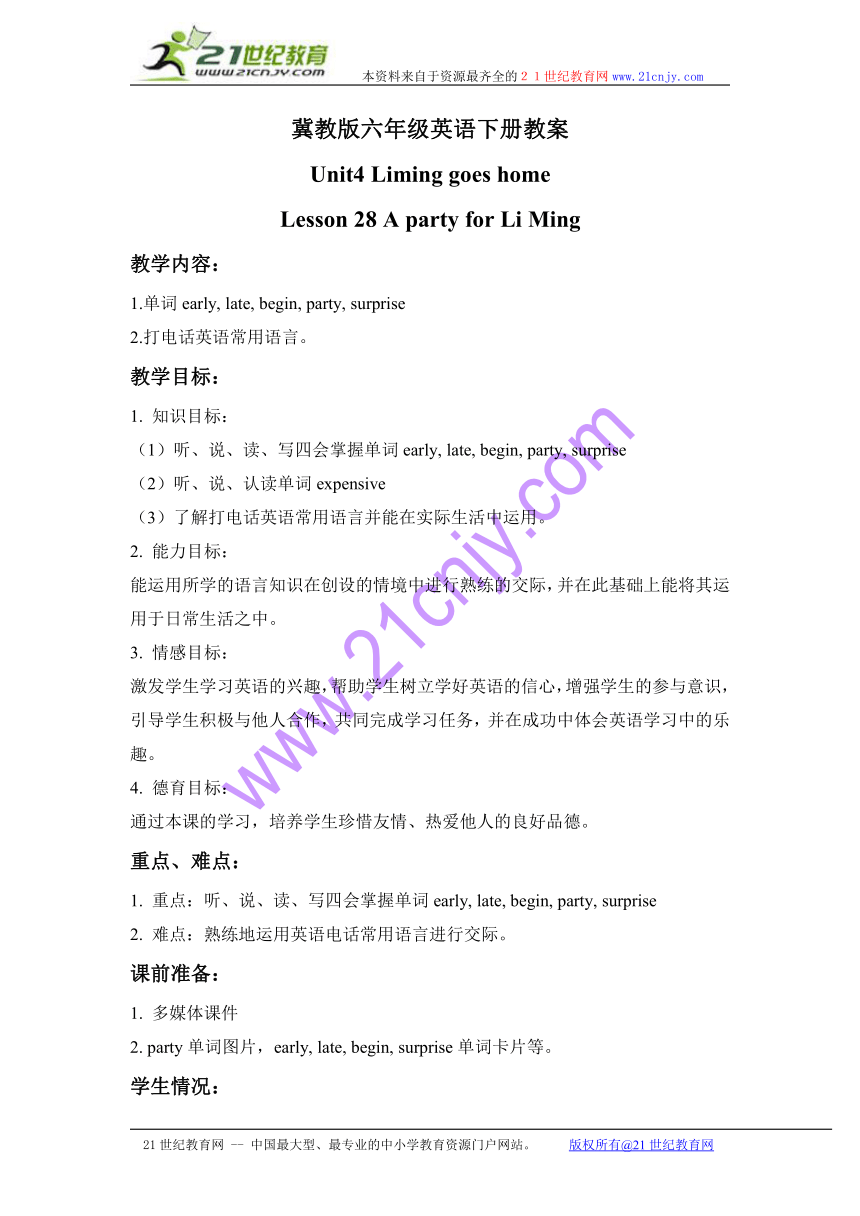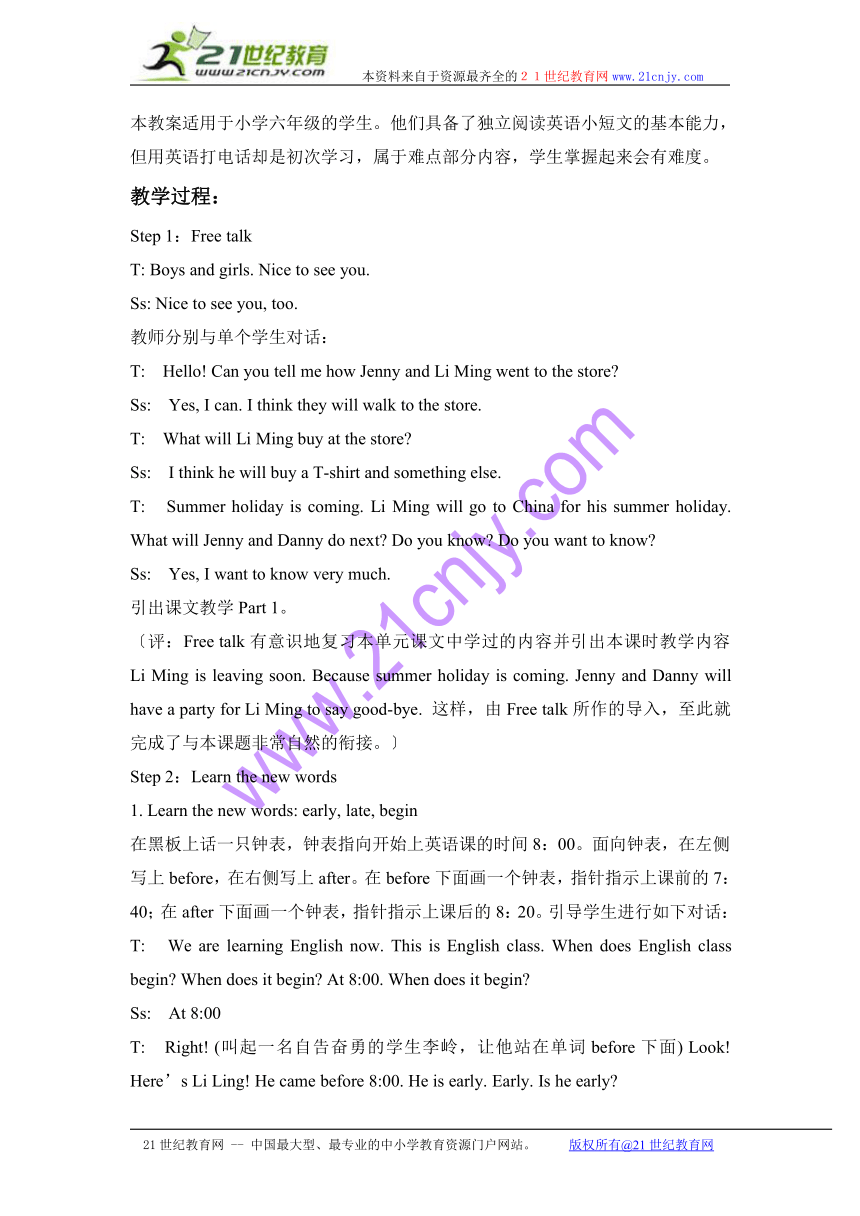六年级英语下册教案 unit 4 lesson 28(3)(冀教版)
文档属性
| 名称 | 六年级英语下册教案 unit 4 lesson 28(3)(冀教版) |

|
|
| 格式 | rar | ||
| 文件大小 | 15.0KB | ||
| 资源类型 | 教案 | ||
| 版本资源 | 冀教版 | ||
| 科目 | 英语 | ||
| 更新时间 | 2010-03-09 19:39:00 | ||
图片预览



文档简介
本资料来自于资源最齐全的21世纪教育网www.21cnjy.com
冀教版六年级英语下册教案
Unit4 Liming goes home
Lesson 28 A party for Li Ming
教学内容:
1.单词early, late, begin, party, surprise
2.打电话英语常用语言。
教学目标:
1. 知识目标:
(1)听、说、读、写四会掌握单词early, late, begin, party, surprise
(2)听、说、认读单词expensive
(3)了解打电话英语常用语言并能在实际生活中运用。
2. 能力目标:
能运用所学的语言知识在创设的情境中进行熟练的交际,并在此基础上能将其运用于日常生活之中。
3. 情感目标:
激发学生学习英语的兴趣,帮助学生树立学好英语的信心,增强学生的参与意识,引导学生积极与他人合作,共同完成学习任务,并在成功中体会英语学习中的乐趣。
4. 德育目标:
通过本课的学习,培养学生珍惜友情、热爱他人的良好品德。
重点、难点:
1. 重点:听、说、读、写四会掌握单词early, late, begin, party, surprise
2. 难点:熟练地运用英语电话常用语言进行交际。
课前准备:
1. 多媒体课件
2. party单词图片,early, late, begin, surprise单词卡片等。
学生情况:
本教案适用于小学六年级的学生。他们具备了独立阅读英语小短文的基本能力,但用英语打电话却是初次学习,属于难点部分内容,学生掌握起来会有难度。
教学过程:
Step 1:Free talk
T: Boys and girls. Nice to see you.
Ss: Nice to see you, too.
教师分别与单个学生对话:
T: Hello! Can you tell me how Jenny and Li Ming went to the store
Ss: Yes, I can. I think they will walk to the store.
T: What will Li Ming buy at the store
Ss: I think he will buy a T-shirt and something else.
T: Summer holiday is coming. Li Ming will go to China for his summer holiday. What will Jenny and Danny do next Do you know Do you want to know
Ss: Yes, I want to know very much.
引出课文教学Part 1。
〔评:Free talk有意识地复习本单元课文中学过的内容并引出本课时教学内容Li Ming is leaving soon. Because summer holiday is coming. Jenny and Danny will have a party for Li Ming to say good-bye. 这样,由Free talk所作的导入,至此就完成了与本课题非常自然的衔接。〕
Step 2:Learn the new words
1. Learn the new words: early, late, begin
在黑板上话一只钟表,钟表指向开始上英语课的时间8:00。面向钟表,在左侧写上before,在右侧写上after。在before下面画一个钟表,指针指示上课前的7:40;在after下面画一个钟表,指针指示上课后的8:20。引导学生进行如下对话:
T: We are learning English now. This is English class. When does English class begin When does it begin At 8:00. When does it begin
Ss: At 8:00
T: Right! (叫起一名自告奋勇的学生李岭,让他站在单词before下面) Look! Here’s Li Ling! He came before 8:00. He is early. Early. Is he early
Ss: Early.
T: Right! Good for you, Li Ling! You are early for English class. (叫起一名自告奋勇的学生姚珊,让她站在单词after下面) Look! What time does English class begin When does it begin
Ss: At 8:00.
T: Right! Here’s Yao Shan. Oh, no! Now it’s after 8:00. She is late. Is she late
Ss: Late!
T: Right! ( 向Yao Shan)Please don’t be late for English class!
〔评:本环节突破教材重点,即单词early, late, begin。通过学校上课时间8:00 引出单词begin,并安排两个学生分别站在7:40、8:20的钟表下面,表示一个early,一个late。通过真实情境,让学生理解early, late, begin,使学生轻松掌握了三个单词。〕
2. Learn the new word: surprise
利用角色表演来演示surprise。找一名自告奋勇的学生,让这名学生站到教室外面去。在这名自告奋勇者的书桌里面藏起一件意外的礼物(一面旗子)。教师说:Let’s give Lin Yu a surprise. This flag is a surprise for her.然后那名学生回到教室,引导如下对话:
T: (向自告奋勇者)I put something in your desk.(向全班)Does Lin Yu know what’s in her desk
Ss: No!
T: Very good. Lin Yu doesn’t know what I put in her desk.. It’s a surprise! A surprise. Say it, please.
Ss: Surprise.
T: Yes! (向自告奋勇者)There is a surprise in your desk. Can you find it
自告奋勇者: Yes!
T: What is it
自告奋勇者: A flag!
〔评:本环节通过“意外”游戏,既增添了课堂的趣味性,融单词于趣味教学中,又使学生很容易地surprise的意思,学生很乐于接受这种教学方式,并取得了另人满意的效果。〕
3. Learn the new word: party
用单词卡片演示party,并用课件显示插图P56,引出对话:
Look! This is a party, a surprise party. Li Ming doesn’t know this party. But in this party, Steven, Jenny, Kim, Danny, Mr. Wood, and Li Ming are coming. I think they will have fun in this party. Do you think so Read after me.跟教师读几遍单词party
Step 3 :Play games: 爱“拼”才会赢
1. 先让学生找到本节课所学与以前所学的相似的单词
party ---park early---ear late---lake
让学生总结这些单词的异同,利用“比较记忆法”快速记住单词。
2. 突破begin,surprise拼写难关
教给学生“分音节记忆单词法”,即双音节或多音节单词,把它们按音节分成若干小部party来记忆,如begin分成be + gin,surprise分成sur +prise。
〔评:本环节专门利用“爱‘拼’才会赢”的游戏,增强了学生拼写单词的能力。时尚又贴切的名字,学生很喜欢接受、也很愿意做这样的游戏,同时在游戏中轻松快捷地记住了更多的单词。因为在“比较记忆法”中能同时比较记忆最少两个或者更多的单词,效果很好。而“分音节记忆单词法”使学生记忆单词更容易了。〕
Step 4 :Learn Part 1 on Page 56 in the Student Book
1.学生看课件展示Part 1中party图片,教师与学生对话:
T: What’s this
Ss: It’s a party.
T: Yes! It’s Li Ming’s party. Listen! Jenny and Danny are talking about the party.
2.学生看课件、听录音并跟读。
3. 再听录音,回答问题:
(1) Why do they have a party
(2) Will they tell Li Ming about the party
4. 找学生回答问题:
(1) Because Li Ming is leaving soon.
(2) They will not tell Li Ming about the party.
〔评:Part 1的教学主要让学生通过听录音、回答问题的方式,在理解对话内容的同时,增强学生听说的能力,教学设计符合六年级学生的知识水平及心理特点。〕
Step 5: Learn Part 2 on Page 57 in the Student Book(Calling on the phone)
1. Presentation
(1)
T: Li Ming is leaving soon. Jenny and Danny will have a party for him. But they will not tell Li Ming. They will invite Steven. Now, Jenny is calling Steven on the phone. Let’s listen!
电脑屏幕显示Part 2对话内容并放录音。内容中用线划出重点句:
a. It’s Jenny calling.
b. When is the party Tomorrow.
c. What time does it begin At 4:00.
学生听录音、看对话内容。
(2)再听录音、回答问题:
a. Who’s calling
b. When is the party
c. What time does it begin
d. Will Steven come to the party
e. How many people are coming to the party Who are they
(3)小组讨论,找学生回答问题。
强调It’s Jenny calling.=This is Jenny speaking.
〔评:本环节通过教师创设情境、多媒体课件展示等教学设计,使学生融入到打电话的氛围中,同时用句子下划线的方法,让学生更容易掌握重点、难点。突出强调了电话常用语言中It’s Jenny calling,也让学生了解此句的另一种表达方法This is Jenny speaking,扩充了学生的知识面,增加了学生的语汇量。〕
2. Practice
T: Tomorrow is my birthday. I want to invite everyone in our class to come to my birthday party. Help me invite your friends on the phone, please!
(1) Discuss in groups how to call your friends on the phone.
(2) Practice to call your friends on the phone
(3) Show your dialogues.
(4) Write down how to call your friends on the phone.
〔评:练习环节中教师先创设“Tomorrow is my birthday.”的情景,让学生利用真实的情景组织对话,给学生以学以致用的机会。但并不是一开始就让学生组织对话,而是先小组讨论,以便让学生有充分的话题材料,更好地组织语言。最后又让学生将对话内容作以笔录,通过仿写打电话用语增强了学生写作的能力。〕
Step 6: Assignment
课后布置作业:
Make a dialogue with a surprise party for your friend.
〔评:通过课后作业,使课上所学语言得以延伸,让学生真正在生活中运用语言,这样的作业能激发学生运用所学语言的兴趣,也能巩固课上所学的知识,真是一举两得!〕
21世纪教育网 -- 中国最大型、最专业的中小学教育资源门户网站。 版权所有@21世纪教育网
冀教版六年级英语下册教案
Unit4 Liming goes home
Lesson 28 A party for Li Ming
教学内容:
1.单词early, late, begin, party, surprise
2.打电话英语常用语言。
教学目标:
1. 知识目标:
(1)听、说、读、写四会掌握单词early, late, begin, party, surprise
(2)听、说、认读单词expensive
(3)了解打电话英语常用语言并能在实际生活中运用。
2. 能力目标:
能运用所学的语言知识在创设的情境中进行熟练的交际,并在此基础上能将其运用于日常生活之中。
3. 情感目标:
激发学生学习英语的兴趣,帮助学生树立学好英语的信心,增强学生的参与意识,引导学生积极与他人合作,共同完成学习任务,并在成功中体会英语学习中的乐趣。
4. 德育目标:
通过本课的学习,培养学生珍惜友情、热爱他人的良好品德。
重点、难点:
1. 重点:听、说、读、写四会掌握单词early, late, begin, party, surprise
2. 难点:熟练地运用英语电话常用语言进行交际。
课前准备:
1. 多媒体课件
2. party单词图片,early, late, begin, surprise单词卡片等。
学生情况:
本教案适用于小学六年级的学生。他们具备了独立阅读英语小短文的基本能力,但用英语打电话却是初次学习,属于难点部分内容,学生掌握起来会有难度。
教学过程:
Step 1:Free talk
T: Boys and girls. Nice to see you.
Ss: Nice to see you, too.
教师分别与单个学生对话:
T: Hello! Can you tell me how Jenny and Li Ming went to the store
Ss: Yes, I can. I think they will walk to the store.
T: What will Li Ming buy at the store
Ss: I think he will buy a T-shirt and something else.
T: Summer holiday is coming. Li Ming will go to China for his summer holiday. What will Jenny and Danny do next Do you know Do you want to know
Ss: Yes, I want to know very much.
引出课文教学Part 1。
〔评:Free talk有意识地复习本单元课文中学过的内容并引出本课时教学内容Li Ming is leaving soon. Because summer holiday is coming. Jenny and Danny will have a party for Li Ming to say good-bye. 这样,由Free talk所作的导入,至此就完成了与本课题非常自然的衔接。〕
Step 2:Learn the new words
1. Learn the new words: early, late, begin
在黑板上话一只钟表,钟表指向开始上英语课的时间8:00。面向钟表,在左侧写上before,在右侧写上after。在before下面画一个钟表,指针指示上课前的7:40;在after下面画一个钟表,指针指示上课后的8:20。引导学生进行如下对话:
T: We are learning English now. This is English class. When does English class begin When does it begin At 8:00. When does it begin
Ss: At 8:00
T: Right! (叫起一名自告奋勇的学生李岭,让他站在单词before下面) Look! Here’s Li Ling! He came before 8:00. He is early. Early. Is he early
Ss: Early.
T: Right! Good for you, Li Ling! You are early for English class. (叫起一名自告奋勇的学生姚珊,让她站在单词after下面) Look! What time does English class begin When does it begin
Ss: At 8:00.
T: Right! Here’s Yao Shan. Oh, no! Now it’s after 8:00. She is late. Is she late
Ss: Late!
T: Right! ( 向Yao Shan)Please don’t be late for English class!
〔评:本环节突破教材重点,即单词early, late, begin。通过学校上课时间8:00 引出单词begin,并安排两个学生分别站在7:40、8:20的钟表下面,表示一个early,一个late。通过真实情境,让学生理解early, late, begin,使学生轻松掌握了三个单词。〕
2. Learn the new word: surprise
利用角色表演来演示surprise。找一名自告奋勇的学生,让这名学生站到教室外面去。在这名自告奋勇者的书桌里面藏起一件意外的礼物(一面旗子)。教师说:Let’s give Lin Yu a surprise. This flag is a surprise for her.然后那名学生回到教室,引导如下对话:
T: (向自告奋勇者)I put something in your desk.(向全班)Does Lin Yu know what’s in her desk
Ss: No!
T: Very good. Lin Yu doesn’t know what I put in her desk.. It’s a surprise! A surprise. Say it, please.
Ss: Surprise.
T: Yes! (向自告奋勇者)There is a surprise in your desk. Can you find it
自告奋勇者: Yes!
T: What is it
自告奋勇者: A flag!
〔评:本环节通过“意外”游戏,既增添了课堂的趣味性,融单词于趣味教学中,又使学生很容易地surprise的意思,学生很乐于接受这种教学方式,并取得了另人满意的效果。〕
3. Learn the new word: party
用单词卡片演示party,并用课件显示插图P56,引出对话:
Look! This is a party, a surprise party. Li Ming doesn’t know this party. But in this party, Steven, Jenny, Kim, Danny, Mr. Wood, and Li Ming are coming. I think they will have fun in this party. Do you think so Read after me.跟教师读几遍单词party
Step 3 :Play games: 爱“拼”才会赢
1. 先让学生找到本节课所学与以前所学的相似的单词
party ---park early---ear late---lake
让学生总结这些单词的异同,利用“比较记忆法”快速记住单词。
2. 突破begin,surprise拼写难关
教给学生“分音节记忆单词法”,即双音节或多音节单词,把它们按音节分成若干小部party来记忆,如begin分成be + gin,surprise分成sur +prise。
〔评:本环节专门利用“爱‘拼’才会赢”的游戏,增强了学生拼写单词的能力。时尚又贴切的名字,学生很喜欢接受、也很愿意做这样的游戏,同时在游戏中轻松快捷地记住了更多的单词。因为在“比较记忆法”中能同时比较记忆最少两个或者更多的单词,效果很好。而“分音节记忆单词法”使学生记忆单词更容易了。〕
Step 4 :Learn Part 1 on Page 56 in the Student Book
1.学生看课件展示Part 1中party图片,教师与学生对话:
T: What’s this
Ss: It’s a party.
T: Yes! It’s Li Ming’s party. Listen! Jenny and Danny are talking about the party.
2.学生看课件、听录音并跟读。
3. 再听录音,回答问题:
(1) Why do they have a party
(2) Will they tell Li Ming about the party
4. 找学生回答问题:
(1) Because Li Ming is leaving soon.
(2) They will not tell Li Ming about the party.
〔评:Part 1的教学主要让学生通过听录音、回答问题的方式,在理解对话内容的同时,增强学生听说的能力,教学设计符合六年级学生的知识水平及心理特点。〕
Step 5: Learn Part 2 on Page 57 in the Student Book(Calling on the phone)
1. Presentation
(1)
T: Li Ming is leaving soon. Jenny and Danny will have a party for him. But they will not tell Li Ming. They will invite Steven. Now, Jenny is calling Steven on the phone. Let’s listen!
电脑屏幕显示Part 2对话内容并放录音。内容中用线划出重点句:
a. It’s Jenny calling.
b. When is the party Tomorrow.
c. What time does it begin At 4:00.
学生听录音、看对话内容。
(2)再听录音、回答问题:
a. Who’s calling
b. When is the party
c. What time does it begin
d. Will Steven come to the party
e. How many people are coming to the party Who are they
(3)小组讨论,找学生回答问题。
强调It’s Jenny calling.=This is Jenny speaking.
〔评:本环节通过教师创设情境、多媒体课件展示等教学设计,使学生融入到打电话的氛围中,同时用句子下划线的方法,让学生更容易掌握重点、难点。突出强调了电话常用语言中It’s Jenny calling,也让学生了解此句的另一种表达方法This is Jenny speaking,扩充了学生的知识面,增加了学生的语汇量。〕
2. Practice
T: Tomorrow is my birthday. I want to invite everyone in our class to come to my birthday party. Help me invite your friends on the phone, please!
(1) Discuss in groups how to call your friends on the phone.
(2) Practice to call your friends on the phone
(3) Show your dialogues.
(4) Write down how to call your friends on the phone.
〔评:练习环节中教师先创设“Tomorrow is my birthday.”的情景,让学生利用真实的情景组织对话,给学生以学以致用的机会。但并不是一开始就让学生组织对话,而是先小组讨论,以便让学生有充分的话题材料,更好地组织语言。最后又让学生将对话内容作以笔录,通过仿写打电话用语增强了学生写作的能力。〕
Step 6: Assignment
课后布置作业:
Make a dialogue with a surprise party for your friend.
〔评:通过课后作业,使课上所学语言得以延伸,让学生真正在生活中运用语言,这样的作业能激发学生运用所学语言的兴趣,也能巩固课上所学的知识,真是一举两得!〕
21世纪教育网 -- 中国最大型、最专业的中小学教育资源门户网站。 版权所有@21世纪教育网
同课章节目录
- Unit 1 Sports
- Lesson 1 Ping-pong and basketball
- Lesson 2 At the sports Shop
- Lesson 3 Let's Play!
- Lesson 4 Did You Have Fun?
- Lesson 5 A Basketball Game
- Lesson 6 A Famous Football Playe
- Again, please!
- Unit 2 Good Health to You!
- Lesson 7 Always Have breakfast!
- Lesson 8 Always Brush Your Teeth!
- Lesson 9 Eat More Vegetables and Fruit!
- Lesson 10 Exercise
- Lesson 11 Work hard!
- Lesson 12 Helen Kelle
- Again, please!
- Unit 3 What Will You Do This Summer?
- Lesson 13 Summer is coming!
- Lesson 14 Tomorrow We Will Play
- Lesson 15 Jenny's Summer Holiday
- Lesson 16 Li Ming's Summer Holiday
- Lesson 17 Danny's Summer Holiday
- Lesson 18 Three Kites in the Sky
- Again, please!
- Unit 4 Li Ming Comes Home
- Lesson 19 Buying Gifts
- Lesson 20 Looking at Photos
- Lesson 21 A party for Li Ming
- Lesson 22 Surprise!
- Lesson 23 Good-bye!
- Lesson 24 Danny's Surprise Cake
- Again, please!
